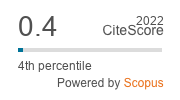Ascertaining foraging rate of pollinators in Ricinus communis L. in Haryana, India
DOI:
https://doi.org/10.33307/entomon.v47i1.684Abstract
Foraging rate of different pollinator species under the genus Apis and non-Apis studied on two castor (Ricinus communis) hybrid under agro-ecological conditions of Haryana, revealed that irrespective of interspecific variation, the maximum foraging rate was found associated with Apis florea followed by A. dorsata, A. cerana and A. mellifera. Further, Eristalnus sp. visits of flowers were the lowest. Adding to the visiting frequency, honey producing bees (Apis sp.) visited significantly more flower per unit time compared to other pollinators (non-Apis) species. The study gave an idea of different foraging rates of different pollinators on castor flower.
Downloads
Published
2022-03-31
How to Cite
Nayak, S. B. ., Yadav, M. K. ., Nihal, R. ., Ramalakshmi, V. ., Dash, L., & Padhy, D. . (2022). Ascertaining foraging rate of pollinators in Ricinus communis L. in Haryana, India. ENTOMON, 47(1), 27–32. https://doi.org/10.33307/entomon.v47i1.684
Issue
Section
Articles


